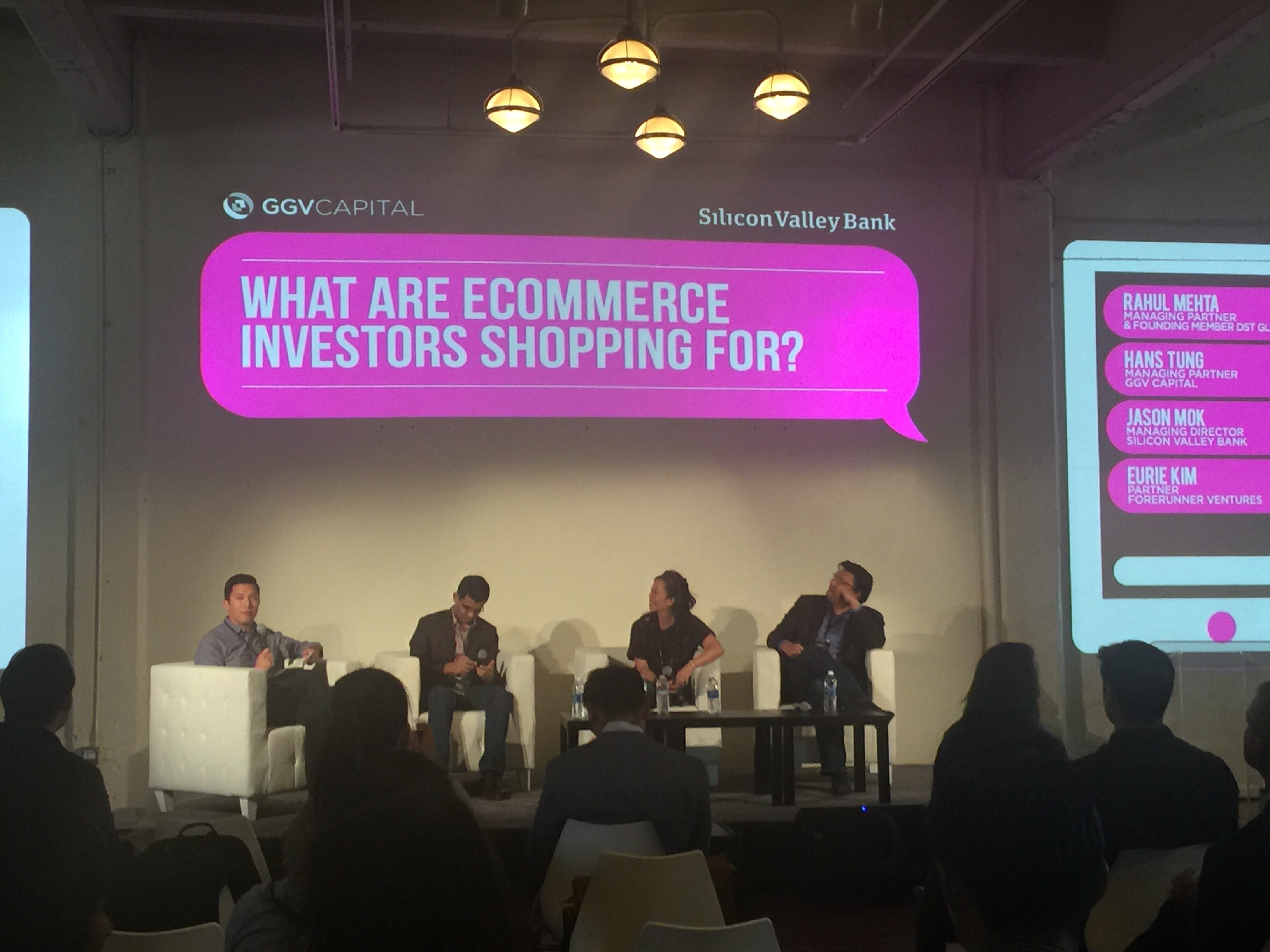A few weeks ago I had the privilege to attend GGV Capital’s Evolving E 16 Summit in San Francisco. I suspect that in the years ahead this event will become a must attend for anyone in commerce on the West Coast or for that matter the US.
Background
I came across GGV Capital 3 years ago when Amir Erfati from the information mentioned them to me in a conversation. There are plenty of commerce investors out there, but what makes GGV Capital special to me is that they have a deeper understanding on global commerce than most investors I have researched. Their unique outlook if formed by having 2 offices (US and China) in their 2 markets of interest. They are on the ground and have deeper relationships with their markets and ecosystems than most investors I have come across.
GGV Capital has investments in Wish, Operator, Boxed, OfferUp, AirBNB. They are investors in marketplaces that connect their areas of operation.

The Evolving E Summit was conceived to solve a weakness which they identified. There is not a good consumer commerce event in San Francisco that allows for startups, investors to mingle and share knowledge. It also supplements GGV’s other Summit that is in New York.
I found the one comment from the Summit to be quite refreshing and honest. “Startups that work in Atherton and San Francisco might not scale well in large global markets”. I have paraphrased that but that exemplifies what GGV Capital think and what their investment thesis is. I should mention that the Evolving E Summit was done in partnership with Silicon Valley Bank which seems to be a longstanding partner of GGV Capital and their portfolio companies.
GGV Capital has been in operation for 16 years, has a team of 55 people across their 2 offices. GGV Capital has invested $300M into businesses that is generating between $10 – $15 Billion in GMV.

Using Technology to delight customers
I found this to be one of the better panels of the Summit – the conversation was lively, knowledge was shared and the verticals covered to be diverse.
What excites the panel members?
- Sephora – Virtual TryOn – has been used over 4 million time, Has 2.6 million users and 1 million tutorials.
- eBay – Artificial Intelligence, Machine Learning – personalisation
- BigCommerce – there is a transformation occurring with on-premise software being replaced with SAAS software. There will be a couple of SAAS winners not the 50 current businesses. Increased distribution will occur when consolidation occurs (Demandware being acquired by Salesforce)
- Tile launched a new product – Tile Mate
What are interesting stats that the panel members could share on mobile commerce?
- eBay has 60% of GMV on mobile.
- Tile has had challenges with up selling customers as mobile is the primary way to use their service.
- Sephora mentioned that they don’t disclose statistics but are “over achievers” for mobile commerce.
- BigCommerce customers has 30% of sales on mobile platforms. Conversion is a challenge and there could be a reason for that. Completing details on your mobile like your address etc is a conversion blocker. This is one of the reasons that eBay has an advantage on mobile due to PayPal Express.
What was apparent from this panel is that everyone is cautiously optimistic about bots. Does bots have a true use case? It felt that customer service was the area that seems to be a natural fit for bots.
Execs from Big Commerce, eBay, Tile & Sephora believe next gene will interact w/ chat bots, for search & customer service. #EvolvingE16
— GGV Capital (@GGVCapital) October 11, 2016
I also agree with the notion that mobile metrics needs to be designed as currently it is still desktop focused; Sephora mentioned that they value frequency in their mobile reporting.

How to scale brands and businesses internationally
The EU is the biggest consumer market for ecommerce businesses. The geographic dispersion of customers provides a market has does cross border commerce repeatedly unlike any other market.
This panel was interesting as all the founders / panel members were from businesses that has scaled internationally. Globalisation of ecommerce is a topic I am passionate about but relevant information and thinking on the topic is hard to find..
What became apparent from all the panel members is that it is imperative that a business has market leadership in the market it was founded in before scaling into other markets. The panel members described very different paths to going cross border – acquisition (Teespring) leveraging a business that has scaled internationally (Shopbop) and doing an MVP with a technical vendor (Eloqui). Diageo mentioned how they have leveraged forward planning to ensure that they have supply for local demand in markets. One factor mentioned by all panel members is the importance of returns for international shoppers. Being able to leverage existing relationships with partners makes cross border commerce easier.
@jjmeng1 shared #EvolvingE16 @shopbop engages, listens to users in each country (esp China, Korea, Japan) separately. Not 1 size fits all.
— Hans Tung (@hanstung) October 11, 2016
“On demand will be everywhere. The advantages of bulk manufacturing are going away.” @teespring founder @walkerteespring at #EvolvingE16 pic.twitter.com/bmyn3ar2H6
— Jeff Richards (@jrichlive) October 11, 2016

This was a panel that I had high hopes for but unfortunately it fizzled to be more of a deep dive into the various social media platforms that had panel members talking on stage. The general consensus was that building business on top of other platforms (facebook, twitter and snapchat) is risky and there for it is important that you create your own community, own platform on which people can find what they are looking for. I found it very interesting that the panel member from Pinterest tip-toed around their ecommerce efforts (“we do not believe in social commerce but rather believe in commerce”. Almost all of the participants mentioned that they did not use paid advertising until their businesses was at least 1 year old. It became apparent to me that we are still looking for a model or use case for social media in ecommerce.

The last panel that I actively listened to was the second last panel of the day. What are ecommerce investors looking for? Well, having investors from 3 different stages, that write different checques to startups was mighty interesting and educational. It is not often that you get investors from top tier venture capital businesses talking about what they look for. Eurie Kim from Forerunner Ventures explained what they look at before they invest in startups. As a seed investor (a very good one) they are able to quickly determine whether an investment fits their thesis.
Hands down the most insightful & entertaining investor panel I’ve attended! Thanks to @eurie_kim @hanstung Rahul #EvolvingE16 @GGVCapital
— jon vlassopulos (@vlasso) October 12, 2016
8/ DST prediction: 1/3 of ecommerce done on smartphones, in 10 years from now will be 75% #EvolvingE16
— Natalie (@ntdsf) October 18, 2016
@eurie_kim mentions ” magnetic founders” as a key metric in her investment thesis for early stage Ecommerce businesses #EvolvingE16
— Hendrik Laubscher (@henlaub) October 11, 2016
@hanstung – “how fast does a team learn & answer questions?” Important factor for funding entrepreneurs & Ecommerce businesses #EvolvingE16
— Hendrik Laubscher (@henlaub) October 11, 2016
“There are 3B internet users worldwide, but only 5 ecommerce companies w/>1M orders per day.” DST Global’s Rahul Mehta #EvolvingE16 pic.twitter.com/Gpm2TDAzZp
— Jeff Richards (@jrichlive) October 11, 2016
Both Rahul Mehta and Hans Tung made the point that if you build a global business then from a valuation point of view it adds billions or multiples for new investors or when the business goes public. I found the level of insights the investors had to be amazing and thus I can understand why their investments are able to increase in value.
Unfortunately I had to leave for a flight from Oakland International Airport but the OfferUp keynote was educational.
Why do I think Elevate E will be an annual event with tickets that will become hard to acquire?
The entire event was properly planned and not a single element was not thought about. If you are an ecommerce executive or someone who works at a commerce startup this is a must attend event. I flew half way around the world to attend the summit and every expectation I had was exceeded.
